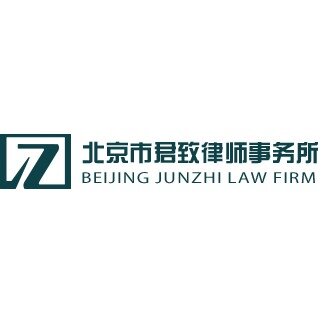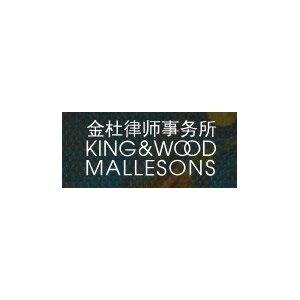Best Sustainable Finance Lawyers in China
Share your needs with us, get contacted by law firms.
Free. Takes 2 min.
Or refine your search by selecting a city:
List of the best lawyers in China
About Sustainable Finance Law in China
Sustainable finance refers to any form of financial service integrating environmental, social, and governance (ESG) criteria into business or investment decisions. In China, sustainable finance has gained significant attention as the country aims to achieve its carbon neutrality goals by 2060 and peak carbon emissions by 2030. The Chinese government has implemented various policies, regulations, and frameworks to encourage green lending, issue green bonds, and promote responsible investing across financial institutions. The aim is to shift investments towards projects and enterprises that foster environmental protection, resource efficiency, and social well-being, creating a more sustainable economy.
Why You May Need a Lawyer
Sustainable finance law in China is dynamic and can be complex, involving multiple regulations, governmental agencies, and compliance requirements. You may need legal help when:
- Structuring and documenting green loans or sustainable investment products
- Issuing or investing in green bonds or sustainability-linked securities
- Navigating regulatory requirements from multiple agencies, such as the People’s Bank of China and the China Securities Regulatory Commission
- Ensuring ongoing compliance with ESG disclosure standards
- Managing risks related to greenwashing accusations or misrepresenting sustainability credentials
- Handling cross-border sustainable finance projects or foreign investment in China’s green assets
- Resolving disputes, regulatory investigations, or administrative penalties related to sustainability claims or violations
Local Laws Overview
Sustainable finance in China is governed by a mix of national policies, regulations, and voluntary standards that continue to evolve:
- The Green Finance Guidelines issued by People’s Bank of China encourage financial institutions to increase support for green industries.
- The Green Bond Endorsed Project Catalogue provides guidance for classifying eligible green projects for bond issuances.
- The China Securities Regulatory Commission (CSRC) has implemented ESG-related information disclosure requirements for listed companies and bond issuers.
- The Environmental Information Disclosure Law, effective from 2022, expands mandatory ESG disclosures for companies involved in pollution or significant resource use.
- Pilot zones for green finance have been set up in several provinces, experimenting with local policies, tax incentives, and regulatory innovations.
- The Guidelines for Establishing the Green Financial System, jointly released by seven ministries in 2016, set a comprehensive agenda for green lending, investment, insurance, and market mechanisms.
International standards also play a role, as China increasingly aligns its sustainable finance regulations with global frameworks such as the Green Bond Principles and the UN Sustainable Development Goals.
Frequently Asked Questions
What counts as a green investment or project in China?
A green investment or project typically contributes to environmental improvement, efficient resource use, or climate change mitigation. The Green Bond Endorsed Project Catalogue provides detailed definitions and categories such as renewable energy, pollution control, ecological conservation, and green buildings.
Are companies required to disclose ESG-related information?
Listed companies and bond issuers are increasingly required to publicly disclose ESG and environmental impact information, especially those operating in high-impact sectors. Voluntary and mandatory disclosures are expanding under CSRC and other authorities.
What are the penalties for non-compliance with sustainable finance rules?
Penalties can include fines, regulatory warnings, administrative sanctions, revocation of licenses, or even criminal liability in cases of severe fraud or environmental damage. Failure to comply with ESG disclosures can also lead to reputational harm and investor withdrawal.
Can foreign investors participate in China's sustainable finance market?
Yes. China welcomes foreign investors in green bonds, equities, funds, and other sustainable finance products. However, there may be restrictions or additional filing procedures; consult legal counsel for guidance.
What legal risks are unique to sustainable finance in China?
Common risks include greenwashing allegations, failure to meet ongoing reporting requirements, or changing definitions of "green" under new guidelines. Policy shifts and enhanced regulatory scrutiny add further risks.
How are green bonds regulated in China?
Green bonds must comply with issuance rules from the People’s Bank of China or CSRC, meet criteria under the Green Bond Endorsed Project Catalogue, and fulfill periodic use-of-proceeds and impact reporting obligations.
Does China provide incentives for sustainable finance?
Yes. Incentives include tax benefits, preferential loan rates, and government support programs, especially within green finance pilot zones. These incentives vary by region and project type.
What should companies do to comply with ESG rules?
Companies should implement internal ESG policies, establish data collection and reporting systems, and regularly update disclosures to meet Chinese laws and relevant global standards.
Is third-party verification required for ESG claims?
While not always mandatory, third-party verification or certification of ESG claims and green bonds is increasingly encouraged to enhance credibility and mitigate regulatory or reputational risks.
Are there specific courts or dispute resolution processes for sustainable finance?
Sustainable finance disputes can often be resolved through regular civil courts or arbitration bodies. Specialized environmental courts also exist in some provinces for cases related to environmental damage or non-compliance.
Additional Resources
If you need more information or guidance, the following resources and organizations are highly recommended:
- People’s Bank of China (PBOC) - Responsible for monetary policy and regulation of green finance guidelines
- China Securities Regulatory Commission (CSRC) - Sets rules for ESG disclosures and green securities
- Ministry of Ecology and Environment - Oversees environmental standards and reporting
- China Green Finance Committee - Industry group providing research and best practice guides
- China Association for Public Companies - ESG training and support for listed companies
- Regional Pilot Green Finance Zones - Local agencies offering incentives and assistance
- International Finance Corporation (IFC) and World Bank - Guidance on green finance in China and emerging markets
- Professional law firms with sustainable finance practices
Next Steps
If you are considering involvement in China’s sustainable finance sector or facing legal issues, you should:
- Identify your specific needs, such as regulatory compliance, transaction support, or dispute resolution
- Gather all relevant documentation, including financial statements, ESG reports, and project proposals
- Research reputable law firms or legal professionals with experience in sustainable finance and ESG in China
- Schedule an initial consultation to assess your legal risks, compliance status, and strategic options
- Continue to stay updated on policy changes and evolving regulations affecting sustainable finance
- Engage with industry associations and training providers to enhance knowledge and readiness
Acting early and seeking specialized legal advice will help you manage risks, ensure compliance, and make the most of opportunities in China's fast-growing sustainable finance market.
Lawzana helps you find the best lawyers and law firms in China through a curated and pre-screened list of qualified legal professionals. Our platform offers rankings and detailed profiles of attorneys and law firms, allowing you to compare based on practice areas, including Sustainable Finance, experience, and client feedback.
Each profile includes a description of the firm's areas of practice, client reviews, team members and partners, year of establishment, spoken languages, office locations, contact information, social media presence, and any published articles or resources. Most firms on our platform speak English and are experienced in both local and international legal matters.
Get a quote from top-rated law firms in China — quickly, securely, and without unnecessary hassle.
Disclaimer:
The information provided on this page is for general informational purposes only and does not constitute legal advice. While we strive to ensure the accuracy and relevance of the content, legal information may change over time, and interpretations of the law can vary. You should always consult with a qualified legal professional for advice specific to your situation.
We disclaim all liability for actions taken or not taken based on the content of this page. If you believe any information is incorrect or outdated, please contact us, and we will review and update it where appropriate.
Browse sustainable finance law firms by city in China
Refine your search by selecting a city.














